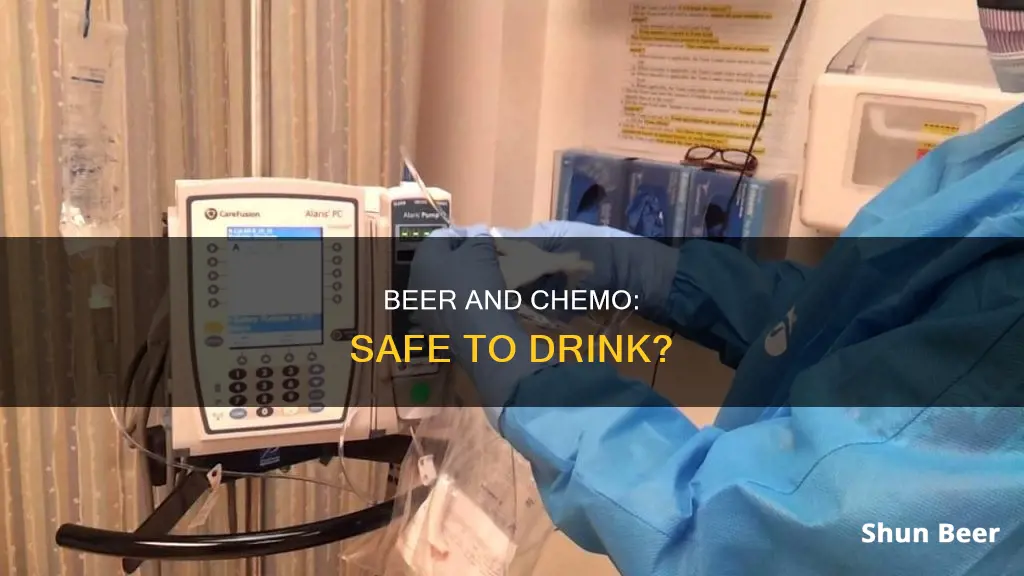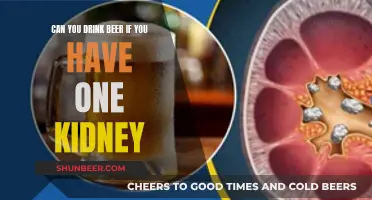
Drinking alcohol during chemotherapy is generally not recommended, as it can worsen side effects such as dehydration, diarrhoea, and mouth sores, as well as interfere with sleep and increase the risk of depression. Alcohol and chemotherapy drugs are both processed by the liver, and drinking during chemotherapy can cause liver inflammation, which may reduce the effectiveness of chemotherapy. Alcohol may also interact with certain chemotherapy drugs, such as Matulane and Gleostine, and drugs used to support cancer treatment, such as painkillers and anti-nausea medications. It is best to consult with a healthcare professional to determine if it is safe to drink alcohol before or after chemotherapy, as it may depend on the specific treatment regimen and drugs involved.
| Characteristics | Values |
|---|---|
| Safety | It is generally advised to avoid drinking beer or any other alcoholic beverage while undergoing chemotherapy. However, drinking a little alcohol may not affect most types of chemotherapy. |
| Alcohol and chemotherapy | Alcohol and chemotherapy drugs are both processed by the liver. Alcohol can cause liver inflammation, which can interfere with the effectiveness of chemotherapy. |
| Alcohol and cancer | Alcohol is a known cancer-causing agent. It increases the risk of mouth, pharynx, and larynx cancers. Limited evidence also suggests an increased risk of lung, pancreatic, and skin cancers. |
| Alcohol and side effects | Alcohol can worsen chemotherapy-related side effects, such as dehydration, mouth sores, nausea, and vomiting. It can also interfere with sleep and increase the risk of depression. |
| Recommendations | It is recommended to limit alcohol consumption to no more than one drink per day for women and two drinks per day for men. |
What You'll Learn
- Beer and wine both contain ethanol, a known cancer-causing agent
- Alcohol can worsen chemotherapy side effects like dehydration, diarrhoea, and mouth sores
- Drinking alcohol while on chemotherapy can place additional stress on your liver
- Alcohol may also cause liver inflammation which can interfere with the effectiveness of chemotherapy
- Alcohol can increase the risk of recurrence for certain cancers

Beer and wine both contain ethanol, a known cancer-causing agent
Alcoholic beverages such as beer and wine contain ethanol, a known carcinogen. Ethanol is the common term for ethyl alcohol, a chemical substance found in alcoholic drinks. When the body breaks down ethanol, it becomes acetaldehyde, a toxic chemical and a probable human carcinogen. It can damage DNA and stop cells from repairing the damage, allowing cancerous cells to grow.
The more alcohol a person drinks, the higher their risk of developing an alcohol-associated cancer. Even those who have no more than one drink per day and binge drinkers have a modestly increased risk of some cancers. The evidence indicates that the more alcohol a person drinks regularly over time, the higher their risk of developing an alcohol-associated cancer.
According to the National Institute on Alcohol Abuse and Alcoholism, a standard alcoholic drink in the United States contains 14 grams of pure alcohol. Generally, this amount of pure alcohol is found in 8–10 ounces of malt liquor and 1.5 ounces of 80-proof distilled spirits or liquor. However, these amounts may not reflect the typical serving sizes people encounter in daily life.
Beer and wine both contain ethanol, and therefore, carry the same risks as other alcoholic beverages. The risks associated with drinking beer or wine include an increased risk of developing several types of cancer, such as head and neck cancer, esophageal cancer, liver cancer, breast cancer, and colorectal cancer.
It is important to note that the overall amount of alcohol consumed is the critical factor in increasing cancer risk, rather than the type of alcohol consumed. Therefore, drinking beer or wine can increase the risk of cancer to the same extent as drinking other types of alcoholic beverages.
Beer After Gallbladder Removal: What You Need to Know
You may want to see also

Alcohol can worsen chemotherapy side effects like dehydration, diarrhoea, and mouth sores
Chemotherapy can have several side effects, and consuming alcohol may worsen some of them. Here are some ways in which alcohol can negatively impact your body's recovery from chemotherapy:
Dehydration:
Alcohol is a diuretic, which means it causes your body to remove fluids more quickly through the renal system, including the kidneys, ureters, and bladder. This can lead to dehydration, especially if you don't drink enough water along with your alcoholic beverage. Dehydration can further contribute to headaches and hangovers, making it even more important to stay hydrated when consuming alcohol.
Diarrhoea:
Alcohol can affect the way your body digests food and can cause diarrhoea, especially if consumed in small amounts. On the other hand, drinking large amounts of alcohol can lead to constipation. Alcohol can irritate the digestive system and cause internal inflammation, exacerbating any existing stomach issues. Therefore, if you are experiencing diarrhoea or an upset stomach after chemotherapy, it is best to refrain from consuming alcohol.
Mouth Sores:
Alcohol can have detrimental effects on oral health. It disrupts the delicate pH balance in the mouth and hampers the liver's ability to process bacteria and toxins, leading to tooth decay and gum disease. Alcohol dependence is associated with a higher prevalence of dental caries, periodontitis, and mucosal lesions. Additionally, alcohol suppresses the immune system, creating an environment conducive to the growth of harmful bacteria, viruses, and fungi in the mouth. This can further worsen any mouth sores or infections caused by chemotherapy.
It is important to note that while moderate alcohol consumption may have minimal impact on oral health, chronic and excessive consumption will have more substantial effects. Additionally, the negative effects of alcohol on oral health are cumulative and can become more noticeable over time.
Therefore, it is generally recommended to limit alcohol consumption, especially for cancer survivors, as it can increase the risk of cancer recurrence. It is advised to consume no more than one drink per day for women and two drinks per day for men.
Beer and Hiccups: Is There a Link?
You may want to see also

Drinking alcohol while on chemotherapy can place additional stress on your liver
Drinking alcohol while undergoing chemotherapy is generally not recommended. This is because alcohol can cause additional stress on your liver, which is already working hard to process the chemotherapy drugs.
Both chemotherapy drugs and alcohol are processed by the liver. When you drink alcohol, your liver breaks it down into various by-products, one of which is acetaldehyde, which is toxic and can damage your liver. Chemotherapy drugs also need to be broken down by the liver, so drinking alcohol during treatment can overload your liver, causing inflammation and impairing its function. This, in turn, can affect the breakdown of chemotherapy drugs, making them less effective.
In addition, alcohol can worsen some of the side effects of chemotherapy, such as dehydration, diarrhoea, and mouth sores. Alcohol is also a known carcinogen, increasing your risk of developing certain types of cancer, including mouth, pharynx, and larynx cancers. Even after completing chemotherapy, it is important to limit alcohol consumption to reduce the risk of cancer recurrence.
If you are undergoing chemotherapy, it is crucial to speak with your healthcare team about whether it is safe for you to consume alcohol. They will be able to advise you based on your specific treatment regimen and health status.
Beer and G6PD Deficiency: What You Need to Know
You may want to see also

Alcohol may also cause liver inflammation which can interfere with the effectiveness of chemotherapy
Alcohol and chemotherapy drugs are both processed by the liver. Drinking alcohol while undergoing chemotherapy can cause liver inflammation, which can interfere with the chemotherapy doing its job.
Chemotherapy drugs are designed to attack fast-growing cancer cells, but they also kill fast-growing healthy cells, including those in the liver. Alcohol is also processed by the liver, and drinking it while undergoing chemotherapy can cause liver inflammation. This inflammation can impair the breakdown of chemotherapy drugs, reducing their effectiveness.
In addition, alcohol can worsen chemotherapy side effects such as dehydration, diarrhoea, and mouth sores. Alcohol can irritate mouth sores or make them worse. If you have mouth sores, it is best to avoid alcohol. Alcohol can also cause dehydration, which may worsen nausea and make it more difficult to tolerate necessary chemotherapy treatments.
Alcohol can also interact with certain chemotherapy drugs, such as Matulane (used for Hodgkin lymphoma) and Gleostine (used for Hodgkin lymphoma and metastatic brain cancer). These interactions can lead to increased side effects such as dizziness, drowsiness, nausea, and vomiting.
It is important to note that the safety of alcohol consumption during chemotherapy depends on the treatment regimen and individual factors. Excessive drinking is never recommended, regardless of the type of chemotherapy. If you are undergoing chemotherapy, it is always best to consult your healthcare team to determine if it is safe for you to consume alcohol and how much you can safely drink.
Ginger Beer: Soft Drink or Not?
You may want to see also

Alcohol can increase the risk of recurrence for certain cancers
Alcohol is a well-known carcinogen that increases the risk of cancer and cancer recurrence. Consuming three to four alcoholic drinks or more per week after a cancer diagnosis may increase the risk of cancer recurrence, particularly in certain cancers.
For instance, studies have shown that breast cancer survivors who drank more than three to four drinks per week were at a higher risk of recurrence. This risk is even greater among postmenopausal and overweight/obese women. Alcohol intake can increase estrogen levels in the body, which may explain the increased risk of recurrence for women taking hormone therapy for estrogen-receptor breast cancer.
Alcohol can also interact with certain chemotherapy drugs, such as Matulane and Gleostine, causing or worsening side effects like nausea, vomiting, and drowsiness. It can also lead to liver inflammation, which can interfere with the effectiveness of chemotherapy.
In addition, alcohol can worsen chemotherapy-induced side effects such as dehydration, mouth sores, nausea, and vomiting. It can also interfere with sleep, increase the risk of depression, and promote bone marrow suppression.
Therefore, it is generally recommended that cancer survivors limit their alcohol consumption to no more than one drink per day for women and two drinks per day for men.
Parked, Drinking Beer: Legal or Not?
You may want to see also
Frequently asked questions
It's best to consult your doctor about drinking alcohol after chemotherapy. Generally, it is advised to avoid alcohol during cancer treatment and limit consumption for overall survivorship.
This depends on your treatment plan and the type of cancer you have. Consult your healthcare team to determine if your specific chemotherapy treatment interacts with alcohol.
If consumed at all, women should have no more than one drink per day, and men should have no more than two drinks per day.
Alcohol can irritate mouth sores and cause liver inflammation, which can interfere with chemotherapy. It can also worsen side effects such as dehydration, nausea, and vomiting.







